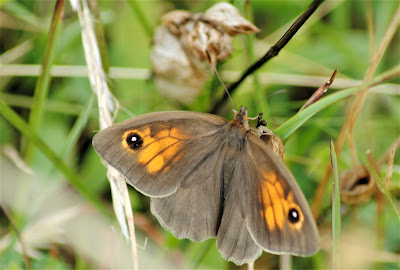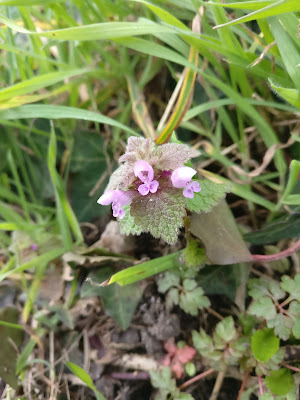This blog may help people explore some of the 'hidden' issues involved in certain media treatments of environmental and scientific issues. Using personal digital images, it's also intended to emphasise seasonal (and other) changes in natural history of the Swansea (South Wales) area. The material should help participants in field-based modules and people generally interested in the natural world. The views are wholly those of the author.
Tuesday, 28 February 2023
Storm in a Tea Cup?
Tesco's Finest Green Tea and Jasmine pyramid tea bags are sold as 'biodegradable'. These teabags are fashioned, using a plant-based bioplastic, polylactic acid. Cork University researchers have tried burying these teabags in the garden. The teabags showed no hint of breaking down, after up to one year in the soil (https://www.theguardian.com/environment/2023/feb/28/tesco-accused-of-greenwashing-over-biodegradable-teabags). The Cork University group suggest that Tesco are 'greenwashing' their teabags. They think the teabags could more fairly be described as 'plant-based' or 'compostable', rather than 'biodegradable'. Tesco have retaliated. They point out that their packaging, advises customers to dispose of used teabags with the local council's food waste. Customers are not encouraged to place the teabags in home compost bins. This is not what most people would understand by use of the term 'biodegradable'. A touch of 'greenwash' here?
Aviation's Fantastical Flight of Fancy
A Royal Society report has poured cold water on UK Aviation's net (jet) zero ambitions. The Aviation industries (plane makers, operators and travel agencies) have claimed for some time, they are working to make flying such that, in the very near future, it will have zero impact on 'greenhouse gas' emissions. This has always seemed unlikely, given the available technologies (https://www.theguardian.com/business/2023/feb/28/scientists-uk-aviation-net-zero-ambitions-half-farmland-double-renewable-electricity). The Royal Society report concludes, that there is currently no clear sustainable alternative to jet fuel. If UK aviation wished to switch to using biofuels (itself, not exactly carbon zero), 50% of the country's farmland would have to switch to fuel production. Feeding the planes by starving the people? If they decided to focus on electrical engines, the UK would have to double its renewable energy supply. Lights would be going out over the country. Pigs might fly? Some improvements may be possible but what is urgently needed is a reduction in short haul flights.
Monday, 27 February 2023
'Like Any Other Source'?
The essay-writing skills of ChatGPT (and Google's Bard, when it becomes available) has caused consternation in teaching circles. A spokesperson for the International Baccalaurete (IB) sees these bots, as an 'extraordinary opportunity' (https://www.theguardian.com/technology/2023/feb/27/chatgpt-allowed-international-baccalaureate-essays-chatbot). The IB is taken by thousands of students in circa 120 UK Secondary schools. It's a pre-University qualification, essentially equivalent to GCSE 'A' levels or Scottish 'Highers'. The IB board will allow ChatGPT-generated content to be incorporated in essays for their examinations. In such cases, they say, this content must be cited 'like any other source' e.g. a quotation from a book or a website. One can argue that ChatGPT and 'Bard' are just technologies (like the word processor) that can be used to benefit everyone. It can also be argued, however, that their output is clearly not 'like any other source'. Bot output is unique, making plagiarism checks futile. Examiners would have to rely on students honestly admitting the bot's employment. Some scientists (vetoed by many journals) have attempted to credit ChatGPT as a co-author on their papers. Students may become too reliant of CHatGPT aid when writing an essay for coursework submission. How, then can one judge their performance on 'unseen' invigilated examinations? Perhaps the days of the essay are numbered?
Reds on the Seabed?
The Beaked red fish can reach 0.5m in length and lives for up to 60 years. Two populations of this fish are found in the Irminger Sea, off Greenland and Iceland. In 2020, scientists from Iceland, Germany and Russia surveyed the states of the two Beaked red fish stocks, concluding that the species was rapidly declining. Long-lived species generally don't recover quickly after population declines. The International Council of Exploration of the Sea, based in Denmark, recommended that all fishing of Beaked red fish should stop. Every country complied except Russia. They challenged the 2020 findings, announcing 'new' research of their own (https://www.theguardian.com/environment/2023/feb/27/russia-international-anger-redfish-overfishing). Russia are currently ranked 151st out of 152 countries on the Illegal, Unreported and Unregulated Fishing Index. It seems a well-earned ranking. Environmental protection seems to be of little or no concern to Russia's government. Russia is a big country and this (along with other current issues) must represent a direct challenge to planetary viability.
Recharging?
Britishvolt ran out of money, preventing it accessing large amounts of promised government funding. The collapsed company is now being taken over by Australia-based Recharge Industries. This take over, revives hopes of creating a £3.8bn 'gigafactory' to make batteries for British-built electric cars. The gigafactory was intended to be located in the North of England, as part of so-called 'levelling up' (https://www.theguardian.com/environment/2023/feb/27/australian-startup-recharge-finalises-deal-to-take-over-uk-battery-maker-britishvolt). 'Levelling up' was a claimed government aim, to make the UK economy less London-centric. Britishvolt's demise was largely attributed to the considerable sums it spent on battery technology and research. Recharge Industries will not have this expense, as it has a relationship with American lithium battery developer C4V. It's long been argued, however, that many UK industries show poor productivity, because they spend so little on Research and Development (R&D). This latest development is unlikely to change UK R&D spending. It will also be interesting to see where any 'gigafactory', if one materialises, is built.
Sunday, 26 February 2023
Bird 'Flu Flow Test?
An 11-year old Cambodian girl has died, after being infected with the H5N1 strain of Avian 'flu. This viral strain is currently having a widespread impact on both wild and domesticated birds, in many parts of the globe. It's easily transmitted by migrating birds. H5N1 could well mutate and become, like Covid19, capable of person-to-person transmission. The UK is currently preparing for such an eventuality, by developing a lateral flow test for H5N1 (https://www.theguardian.com/world/2023/feb/26/lateral-flow-tests-being-prepared-for-outbreaks-of-avian-flu). The new flow test would enable medics to monitor spread of this virus, if Avian 'flu starts to infect substantial numbers of folk in the UK. This is probably the least that should be done. Developing stocks of interferons (anti-virals) for treating H5N1 infections might be a timely move? Let's hope that Avian 'flu largely stays in bird species!
Pulling the Plug?
The four foot-long alligator discovered in Brooklyn's Prospect Park lake, has a bathtub stopper lodged in its abdomen (https://www.theguardian.com/us-news/2023/feb/25/alligator-rescued-new-york-city-park-godzilla-weakened). It seems likely that the female alligator is an ex-pet, abandoned by her 'owners'. The animal is, however, emaciated and in very poor health. It's currently judged to be too dangerous to attempt to remove the plug. You really don't need an alligator in New York. Some people treat animals, as if they are fashion accessories or passing fads! Humanity? What humanity?
Saturday, 25 February 2023
Why Not See If Industrial Hemp Can Be Fast-Tracked?
Industrial hemp doesn't yield significant quantities of psychoactive tetrahydrocannabiol (CBD). This crop does, however, requires much less water than comparable plants. Industrial hemp can also grow in most climates, with up to 2 crops per year. This plant sequesters carbon as well as improving soil quality. Its woody core, grain, oil and fibre have lots of commercial applications. Industrial hemp products are used as dietary ingredients, to make textiles, and to create biofuels, bioplastics and mulch etc. The 2018 Farm Bill, however, prevents industrial hemp waste being used as commercial livestock feed (https://www.theguardian.com/science/2023/feb/24/hemp-green-crop-red-tape-agriculture-livestock). The US Food and Drug Administration (FDA) approved hempseed and oil for human consumption. These ingredients can even be used in pet snacks. Industrial hemp waste cannot, however, be given as feed to farm animals, producing eggs, meat or milk for sale. It's appreciated that care must be taken to ensure that new materials used in farming are completely safe. Commercial livestock feed is, however, increasingly scarce and expensive. All the indications are, that industrial hemp could help plug the commercial livestock feed gap. Increasing Industrial hemp's production could also help counter climate change and improve farming efficiency. Relying on Industrial hemp growers to prove the safety of their waste product as animal feed, would be both expensive and slow. It's already almost 5 years since the Farm Bill. Perhaps, given the circumstances, the FDA should pay for trials to fast-track the process?
California's 'Winter Wonderland'?
Southern California has just experienced a very atypical winter snowstorm. San Francisco recorded record low temperatures. Snow has even fallen on some surfing beaches and the Hollywood sign. This event was triggered by a flow of Arctic air, much further South than usual (https://www.theguardian.com/us-news/2023/feb/24/california-snow-los-angeles-san-francisco-bay-area). Predictably, the blizzard conditions have caused difficulties to road and air transport. A substantial number of homes have also lost power, as lines are brought down by winds. The snowstorm, however, hasn't been all bad news. Some people have enjoyed the unaccustomed 'novelty' of snow. The increased precipitation seen may help counter California's long-established summer drought conditions. Although the precise impact/involvement of climate change is always difficult to predict, but extreme weather events are the order of the day. The future may well see considerably wetter Californian winters (as in Blade Runner). These changes will require expensive infrastructural modifications. The changed weather will also have profound impacts on local flora and fauna (as well as agriculture and gardens).
Friday, 24 February 2023
A Tipping Point For Ecosystems?
The UK Environment Secretary should note that a healthy ecosystem depends on a complex interplay between plants, predators and prey. A Chinese study of fossil species, found that 50% of species in the Permian-Triassic 'Great Dying' became extinct, with virtually no change in ecosystem functioning. This was true, so long as there were some plant, predator and prey species in the ecosystem. Once, however, all the organisms in any of the three roles died out, a 'tipping point' was reached, with rapid ecosystem collapse (https://www.theguardian.com/environment/2023/feb/24/ecosystem-collapse-wildlife-losses-permian-triassic-mass-extinction-study). The scientists believe the current huge, planetary-wide biodiversity losses (greater than in any of the Earth's previous 5 mass extinctions) mark the start of an inevitable collapse of all ecosystems. They feel this collapse can only be averted, by reversing biodiversity losses. Reintroductions of the Eurasian lynx and the Timber wolf to the UK, might be part of such an exercise?
Subscribe to:
Comments (Atom)
-
I n the UK and US, a pparently popular and successful vegan/vegetarian restaurants are reportedly closing or adding meat to their menus ( ...
-
Early ripening fruit may seem convenient but some folk think it confirms environmental stress. There's also a possibility th...



















































%20mating%20NWCW.jpg)

